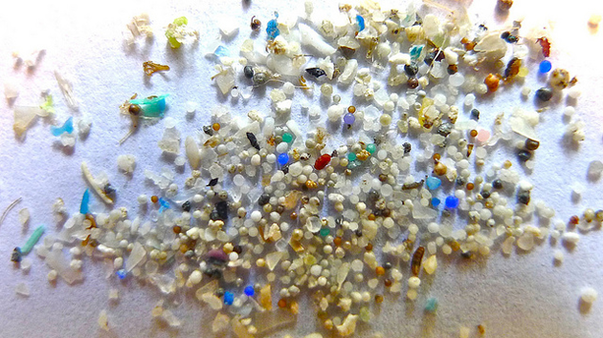 Photo Credit: 5 Gyres Institute Photo Credit: 5 Gyres Institute President Obama signed a new law this week which will ban the use of plastic microbeads in "rinse-off cosmetics"--including face and body wash and toothpaste--by 2017. Called the Microbead-Free Waters Act of 2015 (read the full text of the law here), the law is intended to address growing environmental concerns about the presence of plastic microbeads in our bodies, waterways, oceans, and wildlife. A single tube of face scrub can contain up to 300,000 of these tiny plastic particles, usually made of polyethylene (though they may also be made of polypropylene, poly-e-terephthalate, and polymethyl methacrylate). Many are small enough to make it through the filters in water treatment plant, and estimates suggest up to 300 tons of plastic microbeads are released into US waterways each year. These beads may be mistaken for food and eaten by a range of fish, and can act as toxin "sponges"--absorbing pesticides, phthalates, and heavy metals and increasing their prevalence in the food chain. Microplastic particles are even turning up in the stomachs and tissue of large predatory fish like tuna and swordfish, making clear they are affecting animals that aren't eating them directly. Numerous states have already banned the sale and manufacture of products containing plastic microbeads, and the law faced little opposition even from cosmetic companies, many of which had already pledged to start phasing out plastic from their products in favor of slightly more expensive natural substitutes. To learn more about plastic pollution, watch this 5 Gyres video about microplastics, visit our friends over at Debris Free Oceans, or check out information from NOAA. You can also download product lists for beauty products that don't contain microbeads from Beat the Bead, if you'd like to go microbead-free before 2017.
1 Comment
3/1/2016 04:55:20 am
Thanks for your details and explanations..I want more information from your side..I Am working in <a href="http://www.atka.co.in">Bisleri Authorised Distributor In Chennai</a>.
Reply
Leave a Reply. |
Field Notes
Archives
July 2021
Categories |
|
Partner with us! We are always looking for new schools, scientists, and non-profit organizations to partner with. Please contact us here to start a conversation.
Hear from us! Sign up for our newsletter to hear about what is happening at Field School as well as upcoming offers and specials. |

 RSS Feed
RSS Feed